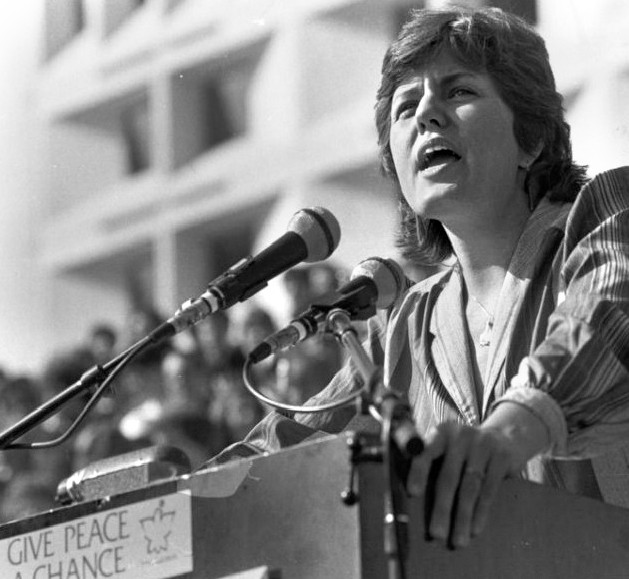Einaudi program promotes nuclear freeze movement’s legacy
By Megan DeMint
Forty years ago this month, disarmament advocate and researcher Randall Caroline Watson Forsberg told peace activists assembled for Mobilization for Survival’s annual meeting that a bilateral nuclear arms freeze “could change the world.”
Forsberg’s vision launched a powerful local- and state-level grassroots lobby for a U.S.-Soviet nuclear arms freeze in the 1980s. Public pressure was one of the factors that drove the Reagan administration’s negotiations with Soviet leader Mikhail Gorbachev and led to major reductions in nuclear weapons by the early 1990s.
The Judith Reppy Institute for Peace and Conflict Studies (PACS), part of the Mario Einaudi Center for International Studies, is making this legacy accessible to a new generation of policymakers, activists and scholars. Forsberg’s previously unpublished Massachusetts Institute of Technology doctoral dissertation will be issued this month as part of the Einaudi Center’s Cornell Global Perspectives book imprint with Cornell University Press.
PACS is working with Cornell University Library to catalog materials from Forsberg’s nuclear freeze campaign and her policy think tank, the Institute for Defense and Disarmament Studies (IDDS).
The work of Forsberg, who died in 2007, is deeply connected to Cornell through her relationships with PACS faculty Judith Reppy, professor emerita of science and technology studies, and Matthew Evangelista, the President White Professor of History and Political Science, both in the College of Arts and Sciences. Reppy was a friend of Forsberg’s and longtime chair of the IDDS board of directors. Evangelista worked with Forsberg when he was an undergraduate at Harvard University and later served as an IDDS research associate and board member.
Evangelista worked with Neta C. Crawford of Boston University, another IDDS affiliate, to co-edit Forsberg’s book, “Toward a Theory of Peace: The Role of Moral Beliefs.” Their introduction explains why Forsberg valued evidence-based advocacy: “For Randy Forsberg, information and argument were power – the power to open and change minds, the power to build a movement.”
The power of information is key during the present political moment, Reppy said.
“The dissertation is an argument about peace,” she said. “It gives agency to people – that there are things you can do. It shows how institutions can change, and it connects the question of the nuclear weapons problem to moral reasoning.”
After Forsberg died, Reppy took charge of IDDS’ vast collection of Forsberg’s speeches, correspondences, reports, posters, recordings and other materials. In 2017, Reppy transferred the collection to Cornell University Library’s Division of Rare and Manuscript Collections.
With the help of Agnieszka Nimark, a PACS visiting scholar, and a recent digitization grant, PACS is bringing select materials from the archive to students and researchers in digital form.
According to Evangelista, who is leading the digital archiving project, the materials have a direct link to contemporary issues, including “everything from how to analyze military forces to how to organize a nationwide peace movement,” he said. “The peace movements of the early 1980s can be seen as precursors to the current International Campaign to Abolish Nuclear Weapons.”
The new digital archive will make materials available electronically to researchers around the world. Items include a complete run of the annual publication Arms Control Reporter, nuclear freeze movement ephemera, and records of talks Forsberg gave to activist groups, universities and government bodies.
Nimark’s parallel project, a documentary that links the broader disarmament movement of the 1980s to local activities at Cornell and in Tompkins County, is just one example of the archive’s usefulness.
Forsberg’s work also appeals to students and researchers in the fields of history, international relations, political science and sociology as they build on the foundation that Forsberg laid, according to Wendy Wolford, vice provost of international affairs.
“Today’s political context,” she said, “dominated by big-man posturing and nativist protectionism, makes it particularly important to highlight this work.”
Megan DeMint is a communication specialist in the Mario Einaudi Center for International Studies.
Media Contact
Get Cornell news delivered right to your inbox.
Subscribe

